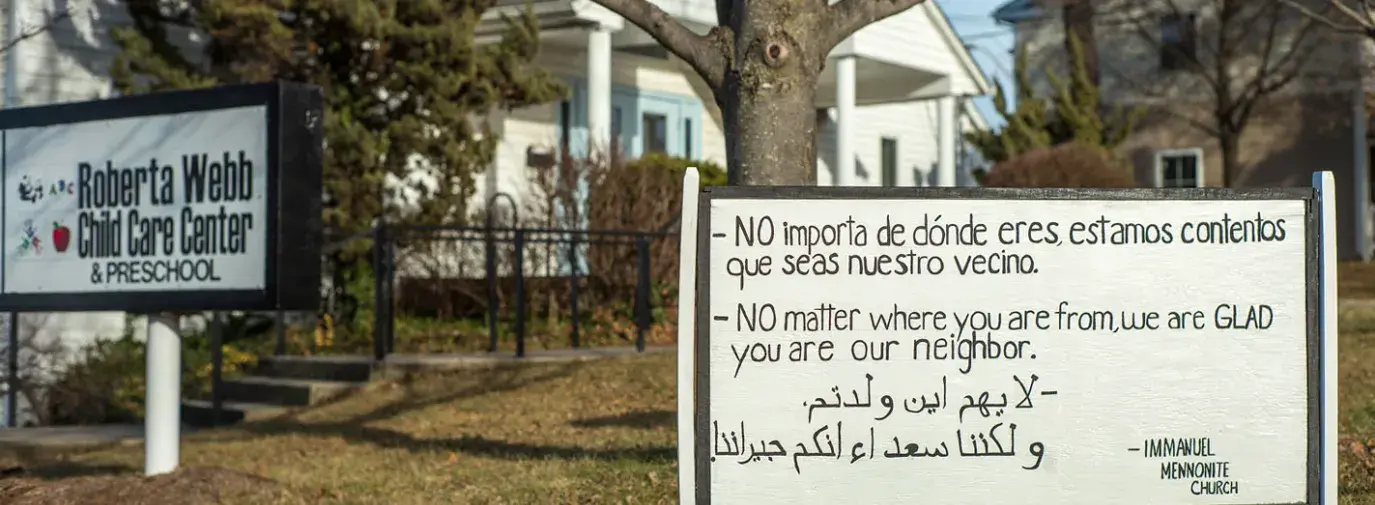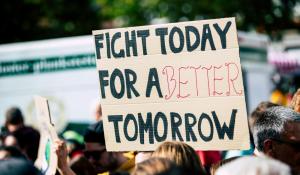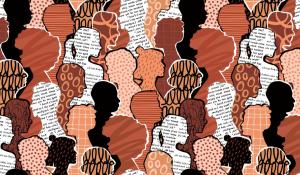
During the presidential primaries, Matthew Bucher didn’t like what some candidates were saying about immigrants, refugees, and people of color. It frustrated him that people might take divisive language to heart. So he took his frustration and turned it into action.
Bucher is the pastor at Immanuel Mennonite Church in Harrisonburg, VA, a small city about 20 miles from the West Virginia border. The town has been growing increasingly diverse in recent years, so Bucher felt a strong need for his church to reach out to new arrivals and to people who might feel targeted by unkind rhetoric against immigrants and people of color.
“It’s important [to take a stand against hate speech], because there has been so much verbal and sometimes visual hatred and distrust of folks who are perceived to be different or perceived to be not valuable enough to be in the neighborhood or to be in the country,” he says.
He proposed the idea to make an inclusivity sign for the church lawn to his congregation, and they readily agreed.
Congregation member and artist Melissa Howard hand-painted the sign, which reads “No matter who you are, we’re glad you are our neighbor” in English, Spanish, and Arabic, the languages most commonly spoken in Harrisonburg. Bucher enlisted translation help from Spanish-speaking church members and from Egyptian friends he’d made during a previous job in Egypt with the Mennonite Central Committee.
When a group of nearby Mennonite pastors wanted to take similar action in their communities, one had a friend turn the hand-painted sign into a colorful, reproducible one (pictured below, courtesy o Cate Matthews, Aplus.com). Immanuel Mennonite printed 200, then another 300, then a thousand. The church posted a PDF for free on its website, ready to print as a 24” x 18” sign. The signs spread through the town, spilling into other towns and then into other states.
 Nobody expected what happened next—with no national campaign, the signs began popping up in neighborhoods across the country and even in Canada. People started requesting translations into languages to suit their own communities, so the website now boasts 11 more versions of the sign, including Somali, Hindi, German, Chinese, Swahili, Hebrew, and more.
Nobody expected what happened next—with no national campaign, the signs began popping up in neighborhoods across the country and even in Canada. People started requesting translations into languages to suit their own communities, so the website now boasts 11 more versions of the sign, including Somali, Hindi, German, Chinese, Swahili, Hebrew, and more.
Bucher says the sign on his church’s lawn reminds the congregation to live the inclusive values of Christianity.
“It creates an awareness that convictions that might start in the heart or in the brain need to be, to use a Christian term, ‘incarnated,’” he says. “They need to be lived into, with our feet, with our hands, with our voices, to make it very clear that we may hold a conviction or hold a belief, but how does that shape our action? How do we walk, each day, each week, with our neighbors and those who are strangers?”
Learn more about Immanuel Mennonite Church and download the high-resolution PDF of the tricolor welcome sign at immanuelmennonite.wordpress.com.







